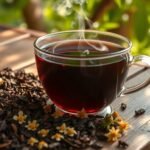Black tea is loved by many around the world for its strong taste and health perks. But, have you thought about how much caffeine is in a cup of black tea? This article will dive into the caffeine levels in black tea. It aims to help both tea lovers and those who care about their health.

Key Takeaways
- Black tea usually has between 47 to 67 milligrams of caffeine in an 8-ounce cup.
- The amount of caffeine in black tea can change due to brewing time and tea quality.
- Black tea has less caffeine than coffee but more than green tea.
- There are decaf black tea options for those wanting to cut down on caffeine.
- Black tea also has many health benefits, like its antioxidants.
What is Black Tea?
Black tea is a favorite drink worldwide. It’s made through a special process that makes it different from green or oolong tea. This process includes withering, rolling, and oxidation. It gives black tea its strong flavor and dark color.
Types of Black Tea
There are many kinds of black tea, each with its own taste. Some well-known ones are:
- Assam Black Tea: From India’s Assam region, it has a strong, malty taste.
- Darjeeling Black Tea: From India’s Darjeeling, it’s known for its floral aroma and complex taste.
- Keemun Black Tea: From China’s Anhui province, it’s smooth, slightly sweet, and smoky.
- Ceylon Black Tea: Made in Sri Lanka, it’s bright, robust, and full-bodied.
Processing of Black Tea
The special way black tea is made gives it its unique taste. The process includes:
- Withering: Tea leaves are allowed to wither, reducing moisture and softening them.
- Rolling: The leaves are rolled to break down cells and release oils and enzymes.
- Oxidation: Rolled leaves are exposed to air for oxidation, which adds flavor and color.
- Drying: Finally, leaves are dried to stop oxidation and preserve quality.
The careful steps in making black tea make it stand out. They contribute to its unique taste and aroma.
Caffeine Content in Black Tea
Black tea stands out for its caffeine content. An 8-ounce cup has 40 to 70 milligrams of caffeine. The amount can change based on the tea type, where it’s grown, and how it’s made.
Black teas have a strong flavor because they have more caffeine. This is due to the way they’re made. The process of withering, rolling, and oxidation keeps more caffeine in the leaves.
| Tea Variety | Caffeine Content (mg per 8-oz cup) |
|---|---|
| Black Tea | 40 – 70 mg |
| Green Tea | 28 – 34 mg |
| White Tea | 15 – 30 mg |
| Oolong Tea | 37 – 55 mg |
The caffeine content in black tea can be affected by several things. This includes where the tea comes from, how it’s processed, and how it’s brewed. For example, steeping the tea for longer can make it more caffeinated.
Knowing about the caffeine content in black tea helps you choose wisely. Whether you need a morning boost or a calming drink in the afternoon, black tea has something for everyone.
How Much Caffeine in a Cup of Black Tea
Black tea can have different amounts of caffeine in an 8-ounce cup. On average, you’ll find about 47 milligrams of caffeine in a standard cup. But, the caffeine can be as low as 14 milligrams or as high as 70 milligrams, depending on the tea and how it’s brewed.
The amount of caffeine in black tea depends on several things. These include the tea’s quality, how it’s processed, and how long it’s steeped. Better-quality teas and longer steeping times usually mean more caffeine. Also, the tea’s origin and type can affect the caffeine level.
To understand better, here’s a quick look at caffeine levels in black tea:
- Standard 8-ounce cup: 47 mg of caffeine
- Lower end: 14 mg of caffeine
- Higher end: 70 mg of caffeine
Remember, the caffeine in black tea per cup can vary a lot. So, it’s best to check the brand or type of tea you’re drinking for the exact caffeine amount.
“Black tea is a beloved beverage around the world, and understanding its caffeine content can help tea drinkers make informed choices.”
Factors Affecting Caffeine Levels
The amount of caffeine in your black tea can change based on a few things. These include how long you brew it and the quality of the tea leaves. Knowing these can help you make a tea that fits your caffeine taste.
Brewing Time
The time you brew your black tea is a big factor in its caffeine. The longer it steeps, the more caffeine gets into your cup. This means a longer brew time can make your tea more caffeinated.
Tea Leaf Quality
The quality of the tea leaves also affects caffeine levels. Better tea leaves, like the top two leaves and the bud, have more caffeine. Choosing high-quality leaves can make your tea more caffeinated.
By knowing how brewing time and leaf quality impact caffeine, you can adjust to get the perfect tea. This tea will have the right mix of flavor and caffeine for you.

Health Benefits of Black Tea
Black tea is not just tasty; it’s also packed with health benefits. It’s full of antioxidants, which are good for our bodies. These antioxidants can help us feel better in many ways.
Antioxidant Properties
Black tea has lots of antioxidants called polyphenols. Theaflavins and thearubigins are two types found in black tea. They fight off harmful free radicals in our bodies.
Free radicals can cause stress and health problems. Drinking black tea often can help keep our bodies healthy. It’s a great way to stay well.
- Improved cardiovascular health: The antioxidants in black tea help lower cholesterol and reduce heart disease risk.
- Reduced cancer risk: Black tea’s antioxidants may prevent some cancers, like prostate and breast cancer.
- Enhanced cognitive function: These antioxidants also support brain health and may prevent age-related cognitive decline.
Enjoying black tea, hot or cold, is a tasty way to get its health benefits and antioxidant properties.
Potential Downsides of Caffeine
The caffeine in black tea offers benefits like better alertness and brain function. But, too much can cause caffeine side effects. These can include jitters, anxiety, trouble sleeping, and stomach problems.
One major downside of caffeine in black tea is its effect on sleep. Drinking black tea before bed can make it hard to fall asleep. It can also mess up your sleep cycle, making you feel tired and cranky the next day.
Too much caffeine from black tea can upset your stomach, causing heartburn and diarrhea. This is especially true for people with sensitive stomachs or conditions like irritable bowel syndrome.
High caffeine intake from black tea can also make you feel anxious and nervous. This can make it hard to get things done and affect your overall happiness. It might even make mental health issues like anxiety worse.
It’s crucial to watch how much caffeine from black tea you consume. Finding a balance helps you enjoy its benefits without the downsides of too much caffeine.

“Moderation is the key to enjoying the benefits of caffeine from black tea without experiencing its potential downsides.”
Comparing Caffeine Levels in Other Beverages
Black tea has a unique caffeine level, between coffee and green tea. Knowing these differences helps us choose our caffeine wisely.
Coffee vs. Black Tea
A cup of coffee has about 95 milligrams of caffeine. Black tea, on the other hand, has around 47 milligrams in an 8-ounce cup. So, coffee has almost twice as much caffeine as black tea.
The roasting of coffee beans increases caffeine extraction. This is why coffee has more caffeine than black tea.
Green Tea vs. Black Tea
Green tea has less caffeine than black tea. An 8-ounce cup of green tea has about 28 milligrams of caffeine. Black tea has 47 milligrams in the same size cup.
The processing of green tea is different from black tea. Black tea is oxidized more, which increases its caffeine.
Knowing these caffeine levels helps us manage our intake. It’s key for those watching their caffeine or seeking balance in their energy levels.
Decaffeinated Black Tea Options
Tea lovers who want to enjoy black tea’s rich flavor without caffeine have options. These teas go through a special process to remove most of the caffeine. This way, you can still enjoy black tea’s taste but with less caffeine.
Twinings of London’s Decaffeinated Black Tea is a favorite. It keeps the strong, aromatic taste of black tea but with less caffeine. Harney & Sons’ Decaffeinated Black Tea is another great choice. It has a smooth flavor that’s perfect for those who want less caffeine.
Some brands, like Tetley, offer “Low Caffeine” black teas. These teas aren’t fully decaf but have less caffeine. They’re great for those who want to enjoy black tea’s taste but with a bit less caffeine.
FAQ | How Much Caffeine is in a Cup of Black Tea
What is Black Tea?
Black tea is made through a special process. It includes withering, rolling, and oxidation. This gives it a strong flavor and a dark color.
What are the Types of Black Tea?
Black tea comes in many types. Each has its own special taste, like Assam, Darjeeling, and Keemun.
How is Black Tea Processed?
Black tea is processed in three steps. First, it’s withered. Then, it’s rolled. Finally, it’s oxidized. This makes its flavor and color unique.
How Much Caffeine is in Black Tea?
Black tea has a lot of caffeine. It usually has 40 to 70 milligrams in an 8-ounce cup. The exact amount depends on the tea type, where it’s grown, and how it’s made.
How Much Caffeine is in a Cup of Black Tea?
A typical 8-ounce cup of black tea has about 47 milligrams of caffeine. But, it can have as little as 14 milligrams or as much as 70 milligrams. This depends on the tea and how it’s brewed.
What Factors Affect the Caffeine Levels in Black Tea?
Several things can change the caffeine in black tea. Brewing time and the tea’s quality are key. Longer brewing and better tea leaves mean more caffeine in your cup.
What are the Health Benefits of Black Tea?
Black tea is full of antioxidants. It’s good for your heart, can lower cancer risk, and boost your brain.
What are the Potential Downsides of Caffeine in Black Tea?
Too much caffeine from black tea or other sources can be bad. It can cause jitters, anxiety, trouble sleeping, and stomach issues.
How Does the Caffeine in Black Tea Compare to Other Beverages?
Black tea has less caffeine than coffee but more than green tea. Knowing this helps you choose how much caffeine you want in your drinks.
Are There Decaffeinated Black Tea Options Available?
Yes, there are decaf black teas. They have most of the caffeine removed. This lets you enjoy black tea’s taste without the caffeine.










